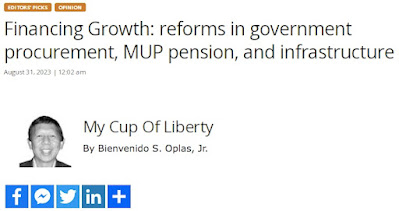https://www.bworldonline.com/opinion/2023/08/31/542315/financing-growth-reforms-in-government-procurement-mup-pension-and-infrastructure/
(Part 2)
There were a number of important development in government fiscal reforms recently. I will focus on three areas: government procurement reforms, military and uniformed personnel (MUP) pensions, and infrastructure.
See these recent reports in BusinessWorld, mostly written by Luisa Maria Jacinta C. Jocson and Keisha B. Ta-asan:
Budget and procurement: “Easier procurement rules seen curbing underspending” (Aug. 15), “Diokno: Tuition-free college education ‘unsustainable’” (Aug. 20), “DBM chief says Q2 GDP growth would have been higher if not for gov’t underspending” (Aug. 21), “Infra law TRO ban applicable to all procurements — DBM” (Aug. 29), “DBM urged to reconsider ‘no TRO’ proposal for procurement deals” (Aug. 29).
Reforms in MUP pension: “House panel approves bill seeking to reform military pension system” (Aug. 16), “Failure to reform military pension system may hurt PHL credit rating” (Aug. 17), “Gov’t expects military pension system to be self-sustaining in 20 years” (Aug. 21), “House to accommodate DND chief’s proposals in MUP pension reform bill” (Aug. 23).
Infrastructure, fiscal balance: “PPP measure expected to clear third reading in Senate this week” (Aug. 22), “3 more added to list of flagship infrastructure projects” (Aug. 24), “Gross borrowings hit P1.4T in 1st half” (Aug. 28), “Deficit-to-GDP ratio still a concern, analysts say” (Aug. 28), “BIR surpasses July collection target by 5%” (Aug. 30), “Rules for Maharlika fund released” (Aug. 30).
During the UP School of Economics (UPSE) Program in Development Economics (PDE) alumni homecoming on Aug. 19, Budget Secretary and PDE alumna Amenah Pangandaman said during her lecture that their Department’s study showed that if the scheduled spending of P170 billion were done by agencies in the second quarter, GDP growth would have been 5.3% and not 4.3% due to multiplier effect of those programs that suffered underspending.
Finance Secretary Benjamin Diokno is correct to say that free tuition in state universities is not fiscally sustainable. I reiterate my position that tertiary education should be a parental or guardian responsibility, not a state responsibility and hence, public spending in state universities should be cut so that more resources can be allocated to public primary and secondary education.
On MUP pension reform, again I agree with Secretary Diokno and the economic team on two basic reforms that must be done: 1.) There should be a mandatory 5% contribution by active personnel in years 1-3, 7% in years 4-6, and 9% starting year 7 onwards, while new entrants will immediately contribute 9%. Contributions are based on monthly base and longevity pay, and government’s counterpart contributions will cover the balance to meet the 21% total pension premium. And, 2.) the removal of indexation for active personnel and new entrants. I reiterate my position that a third reform should be made — that MUP pension should be taxed.
I do not support Defense Secretary Gilberto Teodoro’s disagreement with the two basic reforms made by the economic team. Very likely he would also oppose my additional proposal of taxing the pension.
Our soldiers, policemen, and other MUPs indeed do some dangerous work. But they are not sent to work with just a gun or machete. They are provided by taxpayers with high powered armaments, bombs, tanks, choppers, armored boats, etc. so that they have logistical and organizational superiority over rebels and organized criminals. For the Philippine National Police (PNP) and Armed Forces of the Philippines, they even have free education, free board and lodging for four years at the PNP Academy and Philippine Military Academy.
A big drag on fast economic growth for the Philippines is the continued high budget deficit, high annual borrowings, high interest payments of P500+ billion a year excluding amortization, mainly because of high spending and obligations by the National Government (NG) like endless subsidies and MUP pension (See Table 1).
Government personnel and agencies should do their share to help unburden the taxpayers. Let it be “To serve and protect… the public and taxpayers.” And not just “To serve and protect… our superiors and our pension.”
This week, the economic and infrastructure teams of the Marcos Jr. administration were in Tokyo to convince more Japan investors to come to the Philippines and do business here. Aside from showing the numbers on the macroeconomic fundamentals of the country which are superior compared to many other Asian and European countries, the two teams also showed the administration’s important infrastructure programs and plans. From the virtual presentations, I extracted some data and compressed three sub-tables into one table for the purpose of brevity (See Table 2).
Good thing that the PPP Act will soon be passed by the Senate. It sets clear and above-board procurement processes and awarding of major infrastructure projects. Cynthia Hernandez, who is the PPP Center Executive Director and another PDE alumna, is hopeful that this new legislation will help hasten faster infrastructure development in the country.
Growth should principally come from private investments and household and corporate spending. Financing growth should principally come from private resources too, with government providing the basic infrastructure, the physical-electrical-digital highways that private investments will tap to expand their businesses and job creation. The economic team is doing well in facilitating this kind of growth financing.
---------------
See also:
BWorld 632, Financing Growth, August 30, 2023
BWorld 633, Some trends in de-dollarization and implications for developing countries, Sept. 04, 2023
BWorld 634, BRICS energy and Philippine hosting of FIBA games, Sept. 16, 2023.



No comments:
Post a Comment